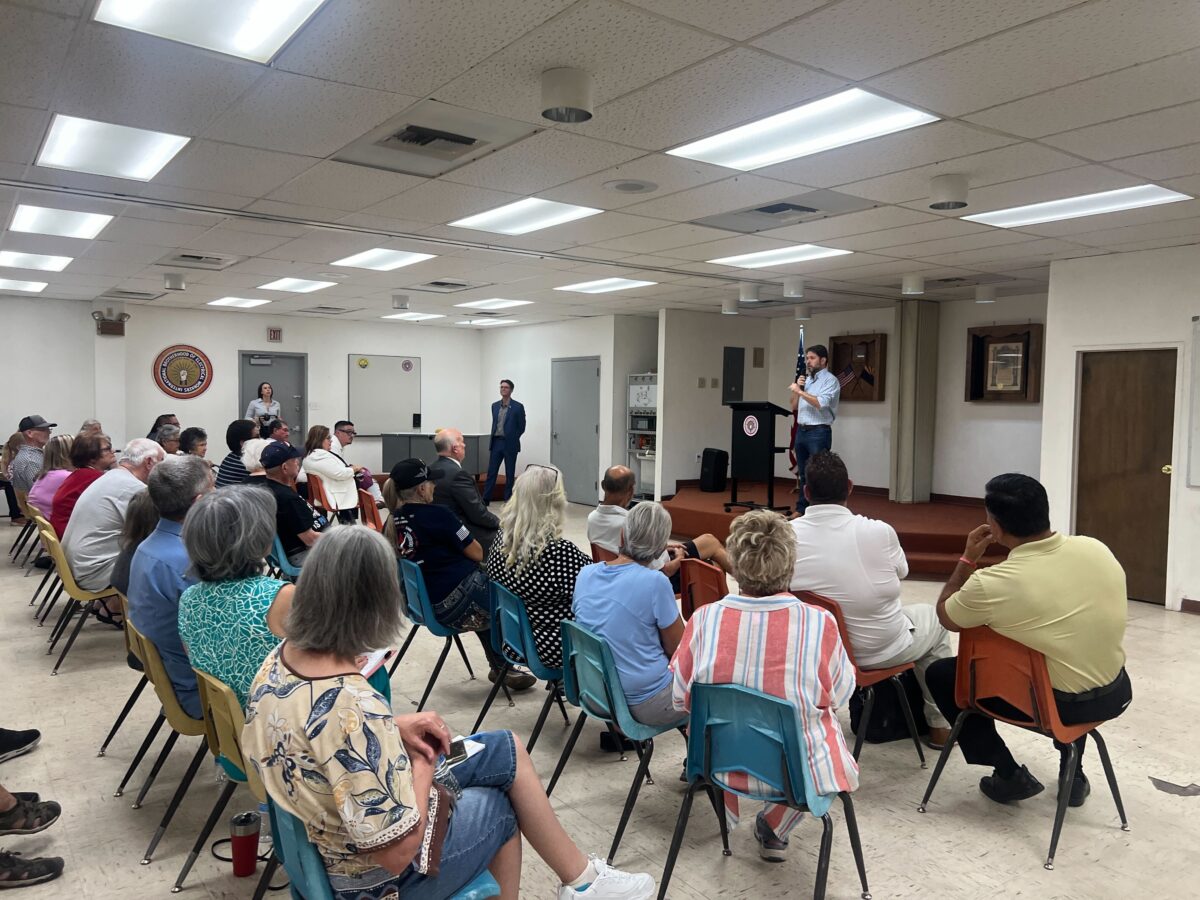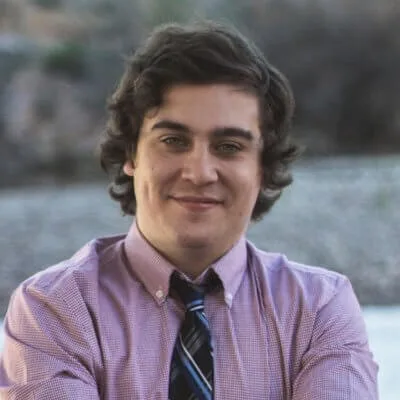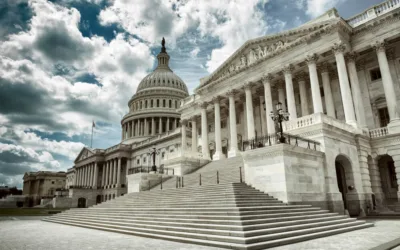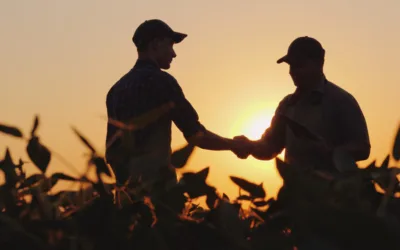
US Sen. Ruben Gallego speaks at a town hall in Globe on Aug. 11, 2025.
US Sen. Ruben Gallego met with voters in Globe and Apache Junction to discuss how the Trump administration is harming Arizonans.
In rural Arizona, the nearest emergency room can be hours away, and for some veterans, even a simple X-ray requires a long drive.
“I had to go to Gilbert to get X-rays,” one woman told US Sen. Ruben Gallego during an Aug. 11 town hall in Globe. “I couldn’t go to Cobre Valley because it’s six weeks out for an appointment.”
That same woman, a veteran, said her community hasn’t had a local Veterans Affairs representative in years. It’s a situation she fears will worsen after the VA announced more than 17,000 employee cuts in the first five months of the year, with 12,000 more expected by Sept. 30.
“Do whatever you can to stop the privatization of the VA,” veteran David Lucier told Gallego at a separate town hall later that day in Apache Junction. “I’m alive today because of the PACT Act.”
The PACT Act, signed into law in 2022, expanded health and disability benefits for veterans exposed to toxic substances during their service. Gallego said privatization would strip resources away from sick veterans.
“If you privatize the VA, they’re only going to take the healthiest veterans,” Gallego said. “The least healthy will stay in the VA system to drive the costs up even further.”
In rural areas, that could be devastating.
The senator, a Democrat, held the two town halls to hear how cuts announced by President Donald Trump’s administration—to health care, veterans services, education, and public broadcasting—are rippling through Arizona communities.
Rural hospitals at risk
Gallego said Arizona’s rural hospitals are already on the brink, with Medicaid cuts threatening to push some over the edge.
“There’s going to be some rural hospitals that may end up closing their emergency rooms,” he said. “The hardest thing to do when an emergency room closes is to reopen it. This is where the state government should be filling that gap with an infusion of funds, at least for a couple of years until maybe things turn around.”
He warned that closures would mean longer travel times for lifesaving care. “I do think this is going to be so drastic that there’s going to be some buyer’s remorse from Republicans,” he added.
Native programs, education, and ICE enforcement
In Apache Junction, attendees also pressed Gallego on the Trump administration’s proposed freeze on federal grants to Native communities. Derek Wesley, an education director for the White Mountain Apache Tribe, said the cuts, which would affect $3.6 billion in Arizona alone, threaten essential services.
“While I do believe there’s a lot of red tape that comes from [the DOE], we still need a lot of services and functions that come out of there,” Wesley said.
Others raised concerns about immigration enforcement. A woman named Samantha accused Immigration and Customs Enforcement agents of targeting schools.
“We have videos of a mother taking her child to school in Chandler, and two blocks away from school being detained,” she said. “This is horrific. What are we doing to stop ICE from harassing these people and their children?”
Gallego said Trump’s deportation policies have gone beyond what many voters expected.
“Right now, it is bad,” he said. “They’re skipping due process…In a state that’s 33% Latino, we want to make sure that isn’t happening.”
He added that he has met asylum seekers and legal residents being detained without criminal records, some even with US citizenship. His proposal: require a fine and background check for those who entered illegally, then provide work permits with a pathway to citizenship.

US Sen. Ruben Gallego speaks at a town hall in Globe on Aug. 11, 2025.
READ MORE: Detained by ICE, a Phoenix woman with leukemia faces death without medical care
Public radio pushed down the dial
While health care and immigration dominated much of the discussion, some residents worried about losing cultural and educational lifelines.
Thomas Dyson, of the City of Maricopa, said that when he visits the White Mountains, NPR is one of the few nonpartisan radio options.
“We get right-wing radio, religious radio, and you get NPR,” he said.
Cuts to NPR could leave rural communities out of the coverage map entirely.
Gallego agreed, saying that children’s programming through NPR and PBS is just as critical as the news coverage.
“Next time we have enough votes, we need to put that money back in,” he said. “It’s not that much money, and there’s a lot of societal good that comes from it.”
In 2024, the Corporation for Public Broadcasting provided $13.5 million to NPR, according to the agency’s website.
State politics in the mix
Gallego said the state can act to soften the blow of federal cuts. But Republican majorities in both chambers of the Legislature mean agreement will be rare. He urged lawmakers to pause tax cuts while bracing for economic fallout from Trump’s tariffs on Mexico, which he warned could cost jobs in Arizona.
All seats in the Legislature are up for election in 2026. Until then, there likely won’t be much policy agreement between the governor and the Legislature.
Support Our Cause
Thank you for taking the time to read our work. Before you go, we hope you'll consider supporting our values-driven journalism, which has always strived to make clear what's really at stake for Arizonans and our future.
Since day one, our goal here at The Copper Courier has always been to empower people across the state with fact-based news and information. We believe that when people are armed with knowledge about what's happening in their local, state, and federal governments—including who is working on their behalf and who is actively trying to block efforts aimed at improving the daily lives of Arizona families—they will be inspired to become civically engaged.


Gwen Frisbie-Fulton: ‘The people closest to the problem are often the ones who can find the solution’
About two years ago, tents started to show up in my neighborhood along the creek beds and in small stands of trees. Most only became visible when...

A love letter to the working class, from Gwen Frisbie-Fulton
It started in the back seat of my family’s Jeep Cherokee, the one with the broken AC and vinyl seats that stuck to my thighs in the late summer...

Project 2025 would make flying more expensive and less convenient for rural and small-town Arizonans
Experts have warned that ending the Essential Air Service program, as Project 2025 sets out to do — and as Donald Trump tried to do during his first...

Opinion: Amplifying Rural Voices—Why Our Stories Matter
In Arizona, the political landscape is as diverse as its geography. For too long, the voices of rural communities have not been prioritized in...





